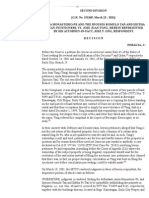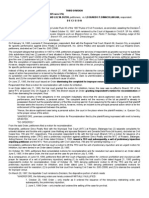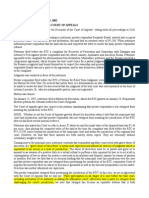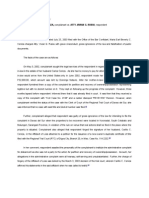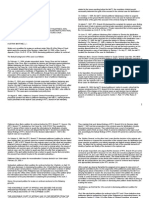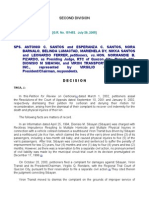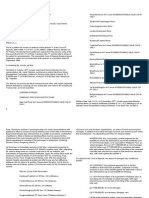0105 G.R. No. 125055 October 30, 1998 A. Francisco Vs CA
0105 G.R. No. 125055 October 30, 1998 A. Francisco Vs CA
Uploaded by
rodolfoverdidajrCopyright:
Available Formats
0105 G.R. No. 125055 October 30, 1998 A. Francisco Vs CA
0105 G.R. No. 125055 October 30, 1998 A. Francisco Vs CA
Uploaded by
rodolfoverdidajrOriginal Description:
Original Title
Copyright
Available Formats
Share this document
Did you find this document useful?
Is this content inappropriate?
Copyright:
Available Formats
0105 G.R. No. 125055 October 30, 1998 A. Francisco Vs CA
0105 G.R. No. 125055 October 30, 1998 A. Francisco Vs CA
Uploaded by
rodolfoverdidajrCopyright:
Available Formats
1
G.R. No. 125055 October 30, 1998 A. Francisco vs CA A. FRANCISCO REA !" AN# #E$E O%&EN! COR%ORA!ION, petitioner, vs. CO'R! OF A%%EA S an( S%O'SES RO&' O S.A. )A$I ONAR an( ER IN#A %. )A$I ONAR, respondents. This is a petition for review on certiorari of the decision rendered on February 29, 1996 by the Court of Appeals 1 reversing, in toto, the decision of the egional Trial Court of !asig City in Civil Case "o. 6229#, as well as the appellate court$s resolution of %ay &, 1996 denying reconsideration. !etitioner A. Francisco ealty and 'evelop(ent Corporation granted a loan of !&.) %illion to private respondents, the spouses o(ulo and *rlinda +avillonar, in consideration of which the latter e,ecuted the following docu(ents- .a/ a pro(issory note, dated "ove(ber 2&, 1991, stating an interest charge of 01 per (onth for si, (onths2 .b/ a deed of (ortgage over realty covered by TCT "o. )3&03, together with the i(prove(ents thereon2 and .c/ an undated deed of sale of the (ortgaged property in favor of the (ortgagee, petitioner A. Francisco ealty. 2 The interest on the said loan was to be paid in four install(ents- half of the total a(ount agreed upon .!9##,###.##/ to be paid in advance through a deduction fro( the proceeds of the loan, while the balance to be paid (onthly by (eans of chec4s post5dated %arch 2&, April 2&, and %ay 2&, 1992. The pro(issory note e,pressly provided that upon 6failure of the %7 T8A87 .private respondents/ to pay the interest without prior arrange(ent with the %7 T8A8** .petitioner/, full possession of the property will be transferred and the deed of sale will be registered. 3 For this purpose, the owner$s duplicate of TCT "o. )3&03 was delivered to petitioner A. Francisco ealty. !etitioner clai(s that private respondents failed to pay the interest and, as a conse9uence, it registered the sale of the land in its favor on February 21, 1992. As a result, TCT "o. )3&03 was cancelled and in lieu thereof TCT "o. !T53))69 was issued in the na(e of petitioner A. Francisco ealty. * !rivate respondents subse9uently obtained an additional loan of !2.) %illion fro( petitioner on %arch 1:, 1992 for which they signed a pro(issory note which readsPROMISSORY NOTE
For value received ; pro(ise to pay A. F A"C;<C7 *A=T> A"' '*?*=7!%*"T C7 !7 AT;7", the additional su( of Two %illion Five @undred Thousand !esos .!2,)##,###.##/ on or before April 2&, 1992, with interest at the rate of four percent .01/ a (onth until fully paid and if after the said date this note andAor the other pro(issory note of !&.) %illion re(ains unpaid andAor unsettled, without any need for prior de(and or notification, ; pro(ise to vacate voluntarily and willfully andAor allow A.F A"C;<C7 *A=T> A"' '*?*=7!%*"T C7 !7 AT;7" to appropriate and occupy for their e,clusive use the real property located at )6 'ragonfly, ?alle ?erde ?;, !asig, %etro %anila. 5 !etitioner de(anded possession of the (ortgaged realty and the pay(ent of 01 (onthly interest fro( %ay 1992, plus surcharges. As respondent spouses refused to vacate, petitioner filed the present action for possession before the egional Trial Court in !asig City. + ;n their answer, respondents ad(itted liability on the loan but alleged that it was not their intent to sell the realty as the undated deed of sale was e,ecuted by the( (erely as an additional security for the pay(ent of their loan. Further(ore, they clai(ed that they were not notified of the registration of the sale in favor of petitioner A. Francisco ealty and that there was no interest then unpaid as they had in fact been paying interest even subse9uent to the registration of the sale. As an alternative defense, respondents contended that the co(plaint was actually for eBect(ent and, therefore, the egional Trial Court had no Burisdiction to try the case. As counterclai(, respondents sought the cancellation of TCT "o. !T53))69 as secured by petitioner and the issuance of a new title evidencing their ownership of the property. , 7n 'ece(ber 19, 1992, the egional Trial Court rendered a decision, the dispositive portion of which reads as followsC@* *F7 *, prescinding fro( the foregoing considerations, Budg(ent is hereby rendered declaring as legal and valid, the right of ownership of A. Francisco ealty Find 'evelop(ent Corporation, over the property subBect of this case and now registered in its na(e as owner thereof, under TCT "o. 3))69 of the egister of 'eeds of iDal, situated at "o. )6 'ragonfly <treet, ?alle ?erde ?;, !asig, %etro %anila.
Conse9uently, defendants are hereby ordered to cease and desist fro( further co((itting acts of dispossession or fro( withholding possession fro( plaintiff of the said property as herein described and specified. Clai( for da(ages in all its for(s, however, including attorney$s fees, are hereby denied, no co(petent proofs having been adduced on record, in support thereof. 8 espondent spouses appealed to the Court of Appeals which reversed the decision of the trial court and dis(issed the co(plaint against the(. The appellate court ruled that the egional Trial Court had no Burisdiction over the case because it was actually an action for unlawful detainer which is e,clusively cogniDable by (unicipal trial courts. Further(ore, it ruled that, even presu(ing Burisdiction of the trial court, the deed of sale was void for being in fact a pactu( co((issoriu( which is prohibited by Art. 2#33 of the Civil Code. !etitioner A. Francisco ealty filed a (otion for reconsideration, but the Court of Appeals denied the (otion in its resolution, dated %ay &, 1996. @ence, this petition for review on certiorari raising the following issuesC@*T@* 7 "7T T@* C7E T 7F A!!*A=< * *' ;" E=;"8 T@AT T@* *8;7"A= T ;A= C7E T @A' "7 +E ;<';CT;7" 7?* T@* C7%!=A;"T F;=*' F> T@* !*T;T;7"* . C@*T@* 7 "7T T@* C7E T 7F A!!*A=< * *' ;" E=;"8 T@AT T@* C7"T ACTEA= '7CE%*"T< <EF+*CT 7F T@* ;"<TA"T CA<* A * C7"<T;TET;?* 7F !ACTE% C7%%;<<7 ;E% A< '*F;"*' E"'* A T;C=* 2#33 7F T@* C;?;= C7'* 7F T@* !@;=;!!;"*<. 7n the first issue, the appellate court stated7stensibly, the cause of action in the co(plaint indicates a case for unlawful detainer, as contra5distinguished fro( accion publiciana. As conte(plated by ule &# of the ules of Court, an action for unlawful detainer which falls under the e,clusive Burisdiction of the %etropolitan or %unicipal Trial Courts, is defined as withholding fro( by a person fro( another for not (ore than one
year, the possession of the land or building to which the latter is entitled after the e,piration or ter(ination of the supposed rights to hold possession by virtue of a contract, e,press or i(plied. .Tenorio vs. 8a(boa, 31 !hil. )02 'i4it vs. 'icaciano, 39 !hil. 00/. ;f no action is initiated for forcible entry or unlawful detainer within the e,piration of the 1 year period, the case (ay still be filed under the plenary action to recover possession by accion publiciana before the Court of First ;nstance .now the egional Trial Court/ .%edina vs. ?aldellon, 6: <C A 2&3/. ;n plain language, the case at bar is a legiti(ate eBect(ent case filed within the 1 year period fro( the Burisdictional de(and to vacate. Thus, the egional Trial Court has no Burisdiction over the case. Accordingly, under <ection :: of F.!. Flg. 129 %unicipal Trial Courts are vested with the e,clusive original Burisdiction over forcible entry and unlawful detainer case. .<en !o *4 %ar4eting Corp. vs. CA, 212 <C A 1)0 G199#H/ 9 Ce thin4 the appellate court is in error. Chat really distinguishes an action for unlawful detainer fro( a possessory action .accion publiciana/ and fro( a reivindicatory action .accion reivindicatoria/ is that the first is li(ited to the 9uestion of possession de facto. An unlawful detainer suit .accion interdictal/ together with forcible entry are the two for(s of an eBect(ent suit that (ay be filed to recover possession of real property. Aside fro( the su((ary action of eBect(ent, accion publiciana or the plenary action to recover the right of possession and accion reivindicatoria or the action to recover ownership which includes recovery of possession, (a4e up the three 4inds of actions to Budicially recover possession. ;llegal detainer consists in withholding by a person fro( another of the possession of a land or building to which the latter is entitled after the e,piration or ter(ination of the for(er$s right to hold possession by virtue of a contract, e,press or i(plied. An eBect(ent suit is brought before the proper inferior court to recover physical possession only or possession de facto and not possession de jure, where dispossession has lasted for not (ore than one year. Forcible entry and unlawful detainer are 9uieting processes and the one5year ti(e bar to the suit is in pursuance of the su((ary nature of the action. The use of su((ary procedure in eBect(ent cases is
intended to provide an e,peditious (eans of protecting actual possession or right to possession of the property. They are not processes to deter(ine the actual title to an estate. ;f at all, inferior courts are e(powered to rule on the 9uestion of ownership raised by the defendant in such suits, only to resolve the issue of possession. ;ts deter(ination on the ownership issue is, however, not conclusive. 10 The allegations in both the original and the a(ended co(plaints of petitioner before the trial court clearly raise issues involving (ore than the 9uestion of possession, to wit- .a/ the validity of the Transfer of ownership to petitioner2 .b/ the alleged new liability of private respondents for !0##,###.## a (onth fro( the ti(e petitioner (ade its de(and on the( to vacate2 and .c/ the alleged continuing liability of private respondents under both loans to pay interest and surcharges on such. As petitioner A. Francisco ealty alleged in its a(ended co(plaint). To secure the pay(ent of the su( of &.) %illion together with the (onthly interest, the defendant spouses agreed to e,ecute a 'eed of %ortgage over the property with the e,press condition that if and when they fail to pay (onthly interest or any infringe(ent thereof they agreed to convert the (ortgage into a 'eed of Absolute <ale in favor of the plaintiff by e,ecuting 'eed of <ale thereto, copy of which is hereto attached and incorporated herein as Anne, 6A62 6. That in order to authoriDe the egister of 'eeds into registering the Absolute <ale and transfer to the plaintiff, defendant delivered unto the plaintiff the said 'eed of <ale together with the original owner$s copy of Transfer Certificate of Title "o. )3&03 of the egistry of iDal, copy of which is hereto attached and (ade an integral part herein as Anne, 6F62 &. That defendant spouses later secured fro( the plaintiff an additional loan of !2.) %illion with the sa(e condition as afore(entioned with 01 (onthly interest2 3. That defendants spouses failed to pay the stipulated (onthly interest and as per agree(ent of the parties, plaintiff recorded and registered the Absolute 'eed of <ale in its favor on and was issued
Transfer Certificate of Title "o. !T53))69, copy of which is hereto attached and incorporated herein as Anne, 6C62 9. That upon registration and transfer of the Transfer Certificate of Title in the na(e of the plaintiff, copy of which is hereto attached and incorporated herein as Anne, 6C6, plaintiff de(anded the surrender of the possession of the above5described parcel of land together with the i(prove(ents thereon, but defendants failed and refused to surrender the sa(e to the plaintiff without Bustifiable reasons thereto2 "either did the defendants pay the interest of 01 a (onth fro( %ay, 1992 plus surcharges up to the present2 1#. That it was the understanding of the parties that if and when the defendants shall fail to pay the interest due and that the 'eed of <ale be registered in favor of plaintiff, the defendants shall pay a (onthly rental of !0##,###.## a (onth until they vacate the pre(ises, and that if they still fail to pay as they are still failing to pay the a(ount of !0##,###.## a (onth as rentals andAor interest, the plaintiff shall ta4e physical possession of the said property2 11 ;t is therefore clear fro( the foregoing that petitioner A. Francisco ealty raised issues which involved (ore than a si(ple clai( for the i((ediate possession of the subBect property. <uch issues range across the full scope of rights of the respective parties under their contractual arrange(ents. As held in an analogous caseThe disagree(ent of the parties in Civil Case "o. 96 of the +ustice of the !eace of @agonoy, Fulacan e,tended far beyond the issues generally involved in unlawful detainer suits. The litigants therein did not raise (erely the 9uestion of who a(ong the( was entitled to the possession of the fishpond of Federico <untay. For all Budicial purposes, they li4ewise prayed of the court to rule on their respective rights under the various contractual docu(ents I their respective deeds of lease, the deed of assign(ent and the pro(issory note I upon which they predicate their clai(s to the possession of the said fishpond. ;n other words, they gave the court no alternative but to rule on the validity or nullity of the above docu(ents. Clearly, the case was converted into the deter(ination of the nature of the proceedings fro( a (ere detainer suit to one that is 6incapable of pecuniary esti(ation6 and thus beyond the legiti(ate authority of the +ustice of the !eace Court to rule on. 12
"or can it be said that the co(pulsory counterclai( filed by respondent spouses challenging the title of petitioner A. Francisco ealty was (erely a collateral attac4 which would bar a ruling here on the validity of the said title. A counterclai( is considered a co(plaint, only this ti(e, it is the original defendant who beco(es the plaintiff .?alisno v. !lan, 10: <C A )#2 .1936/. ;t stands on the sa(e footing and is to be tested by the sa(e rules as if it were an independent action. @ence, the sa(e rules on Burisdiction in an independent action apply to a counterclai( .?ivar v. ?ivar, 3 <C A 30& .196:/2 Calo v. ABar ;nternational, ;nc. v. 22 <C A 996 .1963/2 +avier v. ;nter(ediate Appellate Court, 1&1 <C A 6#) .1939/2 Juiason, !hilippine Courts and Their +urisdictions, 199: ed., p. 2#:/. 13 7n the second issue, the Court of Appeals held that, even 6on the assu(ption that the trial court has Burisdiction over the instant case,6 petitioner$s action could not succeed because the deed of sale on which it was based was void, being in the nature of a pactum commissorium prohibited by Art. 2#33 of the Civil Code which providesArt. 2#33. The creditor cannot appropriate the things given by way to pledge or (ortgage, or dispose of the(. Any stipulation to the contrary is null and void. Cith respect to this 9uestion, the ruling of the appellate court should be affir(ed. !etitioner denies, however, that the pro(issory notes contain a pactu( co((issoriu(. ;t contends that I Chat is envisioned by Article 2#33 of the Civil Code of the !hilippines is a provision in the deed of (ortgage providing for the auto(atic conveyance of the (ortgaged property in case of the failure of the debtor to pay the loan .Tan v. Cest Coast =ife Assurance Co., )0 !hil. :61/. A pactum commissorium is a forfeiture clause in a deed of mortgage .@echanova v. Adil, 100 <C A 0)#2 %ontevergen v. Court of Appeals, 112 <C A 6012 eport of the Code Co((ission, 1)6/. Thus, before Article 2#33 can find application herein, the subBect deed of (ortgage (ust be scrutiniDed to deter(ine if it contains such a provision giving the creditor the right 6to appropriate the
things given by way of (ortgage without following the procedure prescribed by law for the foreclosure of the (ortgage6 . anBo v. <al(on, 1) !hil. 0:6/. IN SHORT THE PROS!RI"E# STIP$%&TION SHO$%# "E 'O$N# IN THE MORT(&(E #EE# ITSE%'. 1* The contention is patently without (erit. To sustain the theory of petitioner would be to allow a subversion of the prohibition in Art. 2#33. ;n Na)pil v* Intermediate &ppellate !ourt, 15 which involved the violation of a constructive trust, no deed of (ortgage was e,pressly e,ecuted between the parties in that case- "evertheless, this Court ruled that an agree(ent whereby property held in trust was ceded to the trustee upon failure of the beneficiary to pay his debt to the for(er as secured by the said property was void for being a pactum commissorium. ;twas there heldThe arrange(ent entered into between the parties, whereby !ulong %aulap was to be 6considered sold to hi( .respondent/ . . .6 in case petitioner fails to rei(burse ?aldes, (ust then be construed as tanta(ount to a pactum commissorium which is e,pressly prohibited by Art. 2#33 of the Civil Code. For, there was to be auto(atic appropriation of the property by ?aldeD in the event of failure of petitioner to pay the value of the advances. T+us contrar, to respondent-s manifestations all t+e elements of a pactum commissorium .ere present/ t+ere .as a creditor0debtor relations+ip bet.een t+e parties1 t+e propert, .as used as securit, for t+e loan1 and t+ere .as automatic appropriation b, respondent of Pulong Maulap in case of default of petitioner. 1+ <i(ilarly, the Court has struc4 down such stipulations as contained in deeds of sale purporting to be pacto de retro sales but found actually to be e9uitable (ortgages. ;t has been consistently held that the presence of even one of the circu(stances enu(erated in Art. 16#2 of the "ew Civil Code is sufficient to declare a contract of sale with right to repurchase an e9uitable (ortgage. This is so because pacto de retro sales with the stringent and onerous effects that acco(pany the( are not favored. ;n case of doubt, a contract purporting to be a sale with the right to repurchase shall be construed as an e9uitable (ortgage.
!etitioner, to prove her clai(, cannot rely on the stipulation in the contract providing that co(plete and absolute title shall be vested on the vendee should the vendors fail to redee( the property on the specified date. <uch stipulation that the ownership of the property would auto(atically pass to the vendee in case no rede(ption was effected within the stipulated period is void for being a pactum commissorium which enables the (ortgagee to ac9uire ownership of the (ortgaged property without need of foreclosure. ;ts insertion in the contract is an avowal of the intention to (ortgage rather that to sell the property. 1, ;ndeed, in Re,es v* Sierra 18 this Court categorically ruled that a (ortgagee$s (ere act of registering the (ortgaged property in his own na(e upon the (ortgagor$s failure to redee( the property a(ounted to the e,ercise of the privilege of a (ortgagee in a pactum commissorium. 7bviously, fro( the nature of the transaction, applicant$s a predecessor5in5interest is a (ere (ortgagee, and ownership of the thing (ortgaged is retained by Fasilia Feltran, the (ortgagor. The (ortgagee, however, (ay recover the loan, although the (ortgage docu(ent evidencing the loan was nonregistrable being a purely private instru(ent. Failure of (ortgagor to redee( the property does not auto(atically vest ownership of the property to the (ortgagee, which would grant the latter the right to appropriate the thing (ortgaged or dispose of it. This violates the provision of Article 2#33 of the "ew Civil Code, which readsThe creditor cannot appropriate the things given by way of pledge or (ortgage, or dispose by the(. Any stipulation to the contrary is null and void. The act of applicant in registering the property in his own na(e upon (ortgagor$s failure to redee( the property would to a pactum commissorium which is against good (orals and public policy. 19 Thus, in the case at bar, the stipulations in the pro(issory notes providing that, upon failure of respondent spouses to pay interest, ownership of the property would be auto(atically transferred to petitioner A. Francisco ealty and the deed of sale in its favor would be registered, are in substance a pactum commissorium. They e(body
the two ele(ents of pactum commissorium as laid down in Ey Tong v. Court of Appeals, 20 to witThe prohibition on pactu( co((issoriu( stipulations is provided for by Article 2#33 of the Civil CodeArt. 2#33. The creditor cannot appropriate the things given by way of pledge or (ortgagee, or dispose of the sa(e. Any stipulation to the contrary is null and void. The afore9uoted provision furnishes the two ele(ents for pactu( co((issoriu( to e,ist- .1/ that there should be a pledge or (ortgage wherein a property is pledged or (ortgaged by way of security for the pay(ent of the principal obligation2 and .2/ that there should be a stipulation for an auto(atic appropriation by the creditor of the thing pledged or (ortgaged in the event of non5 pay(ent of the principal obligation within the stipulated period. 21 The subBect transaction being void, the registration of the deed of sale, by virtue of which petitioner A. Francisco ealty was able to obtain TCT "o. !T53))69 covering the subBect lot, (ust also be declared void, as prayed for by respondents in their counterclai(. C@* *F7 *, the decision of the Court of Appeals is AFF; %*', insofar as it dis(issed petitioner$s co(plaint against respondent spouses on the ground that the stipulations in the pro(issory notes are void for being a pactum commissorium, but *?* <*' insofar as it ruled that the trial court had no Burisdiction over this case. The egister of 'eeds of !asig City is hereby 7 '* *' to CA"C*= TCT "o. !T53))69 issued to petitioner and ;<<E* a new one in the na(e of respondent spouses.
You might also like
- CONSULTANT REVIEWER PART 2 With AnswersDocument28 pagesCONSULTANT REVIEWER PART 2 With Answersarlene tayamoraNo ratings yet
- Lim Se v. ArgelDocument2 pagesLim Se v. ArgelmwaikeNo ratings yet
- Appeal Memorandum - Secretaria Vs Betita - RTC11Document16 pagesAppeal Memorandum - Secretaria Vs Betita - RTC11Karen Cate Ilagan Pinto100% (2)
- DOA With Contract of Sale SampleDocument5 pagesDOA With Contract of Sale SampleJohn Michael VidaNo ratings yet
- Format For Tripartite Agreement - UBIDocument5 pagesFormat For Tripartite Agreement - UBInpmehendale0% (1)
- 0129 G.R. No. 77502 January 15, 1988 Santiago Vs Pioneer Savings and LoanDocument3 pages0129 G.R. No. 77502 January 15, 1988 Santiago Vs Pioneer Savings and LoanrodolfoverdidajrNo ratings yet
- Suit Cannot Be Rejected by Trial Courts For Non-Payment of Court Fee AloneDocument22 pagesSuit Cannot Be Rejected by Trial Courts For Non-Payment of Court Fee AloneLive Law100% (2)
- Angeles V CA 102 Phil 1006Document2 pagesAngeles V CA 102 Phil 1006Clive HendelsonNo ratings yet
- Francisco Vs MejiaDocument11 pagesFrancisco Vs MejiaLeomar Despi LadongaNo ratings yet
- Evidence Judical NoticeDocument4 pagesEvidence Judical Noticemhilet_chiNo ratings yet
- G.R. No. 144025. December 27, 2002 Gonzaga vs. Hon. Court of AppealsDocument2 pagesG.R. No. 144025. December 27, 2002 Gonzaga vs. Hon. Court of AppealsEd ChanNo ratings yet
- Joventino A. Cornista For Petitioner. Yolanda Quisumbing-Javellana & Associates For Private RespondentDocument13 pagesJoventino A. Cornista For Petitioner. Yolanda Quisumbing-Javellana & Associates For Private RespondentSwitle Mae TamangNo ratings yet
- Lirag Textile Mills Vs Sss - FullDocument7 pagesLirag Textile Mills Vs Sss - FullLariza AidieNo ratings yet
- Tomas Claudio Colleges v. Court of AppealsDocument5 pagesTomas Claudio Colleges v. Court of AppealsOw WawieNo ratings yet
- Pleasantville V CA (1996)Document5 pagesPleasantville V CA (1996)Zan BillonesNo ratings yet
- Second Division: DecisioDocument12 pagesSecond Division: DecisiothesidelinetragedyNo ratings yet
- Plaintiff-Appellee Vs Vs Defendant-Appellant Ramon Zaldarriaga, Montinola de La RamaDocument3 pagesPlaintiff-Appellee Vs Vs Defendant-Appellant Ramon Zaldarriaga, Montinola de La RamaSarahNo ratings yet
- Monasterio Pe V TongDocument7 pagesMonasterio Pe V TongCharismaPerezNo ratings yet
- Vergara v. Suelto (Mine)Document2 pagesVergara v. Suelto (Mine)Rind Bergh DevelosNo ratings yet
- 2 Civ AcDocument5 pages2 Civ AcJenMarkNo ratings yet
- Land Titles Finals Cases WD ResultsDocument4 pagesLand Titles Finals Cases WD Resultsmanol_salaNo ratings yet
- Regional Trial Court (RTC) of Quezon City, Branch 101, and Leonardo P. Dimaculangan"Document64 pagesRegional Trial Court (RTC) of Quezon City, Branch 101, and Leonardo P. Dimaculangan"Nikki Rosana RatonNo ratings yet
- Municipality of Tiwi vs. Antonio B. BetitoDocument5 pagesMunicipality of Tiwi vs. Antonio B. BetitoCharise MacalinaoNo ratings yet
- Corpo CASES Salvatierra LoreanoDocument20 pagesCorpo CASES Salvatierra LoreanoCyrus Santos MendozaNo ratings yet
- G.R. No. 131282 January 4, 2002 Gabriel L. Duero vs. Hon - Court of AppealsDocument2 pagesG.R. No. 131282 January 4, 2002 Gabriel L. Duero vs. Hon - Court of AppealsEd ChanNo ratings yet
- Nego Digests 1Document5 pagesNego Digests 1Bryan MagnayeNo ratings yet
- Property Finals CasesDocument9 pagesProperty Finals CasesMegan MateoNo ratings yet
- 0128 G.R. No. 94247 September 11, 1991 Mojica Vs CADocument3 pages0128 G.R. No. 94247 September 11, 1991 Mojica Vs CArodolfoverdidajrNo ratings yet
- Civpro Digest SummarizedDocument17 pagesCivpro Digest SummarizedpasmoNo ratings yet
- 1 Avellana Vs PPDocument5 pages1 Avellana Vs PPchibi_carolNo ratings yet
- Tijam Vs Sibonghanoy CASE: Appeal From The Orders of The CA. FactsDocument2 pagesTijam Vs Sibonghanoy CASE: Appeal From The Orders of The CA. FactsSjaneyNo ratings yet
- Ceniza vs. RubiaDocument6 pagesCeniza vs. RubiaPaulo Miguel GernaleNo ratings yet
- Madarang v. CA (2005)Document3 pagesMadarang v. CA (2005)Zan BillonesNo ratings yet
- Compiled Rule 62 DigestsDocument12 pagesCompiled Rule 62 DigestsAnthony WadeNo ratings yet
- Castillo & Suck For Plaintiffs-Appellees. Jose Q. Calingo For Defendants-AppellantsDocument19 pagesCastillo & Suck For Plaintiffs-Appellees. Jose Q. Calingo For Defendants-Appellantssharppy38No ratings yet
- Civpro Digest SummarizedDocument13 pagesCivpro Digest SummarizedpasmoNo ratings yet
- Tumpag V TumpagDocument7 pagesTumpag V Tumpagyasuren2No ratings yet
- 01 Holy See v. Rosario (1994)Document5 pages01 Holy See v. Rosario (1994)Zan BillonesNo ratings yet
- Balais-Mabanag vs. Register of Deeds of Quezon CityDocument20 pagesBalais-Mabanag vs. Register of Deeds of Quezon CityDianne May CruzNo ratings yet
- Country Bankers Insurance vs. CA, GR. 85161, Sept 9, 1991Document9 pagesCountry Bankers Insurance vs. CA, GR. 85161, Sept 9, 1991Cza PeñaNo ratings yet
- Case Dismissals For Lack of Standing To ForecloseDocument28 pagesCase Dismissals For Lack of Standing To Foreclosejacque zidane100% (2)
- San Diego V Montesa (1962)Document2 pagesSan Diego V Montesa (1962)Zan Billones100% (1)
- Rem 2Document63 pagesRem 2Marge RoseteNo ratings yet
- Estrella vs. PNBDocument13 pagesEstrella vs. PNBJosine ProtasioNo ratings yet
- Eulogio v. Bell, Sr.Document17 pagesEulogio v. Bell, Sr.MokeeCodillaNo ratings yet
- SKUNACvs SYLIANTENGDocument9 pagesSKUNACvs SYLIANTENGBryan MagnayeNo ratings yet
- WON The Action Is Incapable of Pecuniary EstimationDocument5 pagesWON The Action Is Incapable of Pecuniary EstimationJean Monique Oabel-TolentinoNo ratings yet
- 2nd Assignment of CasesDocument84 pages2nd Assignment of CasesMabel Albares0% (1)
- RCBC v. de Castro 168 Scra 49Document10 pagesRCBC v. de Castro 168 Scra 49rudyblaze187No ratings yet
- Barfel Dev Co V CADocument4 pagesBarfel Dev Co V CAAnonymous gzsN1pQRNo ratings yet
- Diona Vs Balangue Et AlDocument17 pagesDiona Vs Balangue Et AlAnabelle Talao-UrbanoNo ratings yet
- Venue Effects of Stipulations On Venue Briones vs. Court of Appeals G.R. No. 204444 January 14, 2015 FactsDocument7 pagesVenue Effects of Stipulations On Venue Briones vs. Court of Appeals G.R. No. 204444 January 14, 2015 FactscyhaaangelaaaNo ratings yet
- Supreme Court: Bartolome Guirao and Antonio M. Orara For Petitioners. Gonzales and Fernandez For RespondentsDocument3 pagesSupreme Court: Bartolome Guirao and Antonio M. Orara For Petitioners. Gonzales and Fernandez For RespondentsZan BillonesNo ratings yet
- Property Article 487-493 (Nos. 55-58)Document7 pagesProperty Article 487-493 (Nos. 55-58)Rodel Acson AguinaldoNo ratings yet
- Punzalan Jr. vs. Vda de LacsamanaDocument3 pagesPunzalan Jr. vs. Vda de LacsamanaRevz LamosteNo ratings yet
- Manila Banking v. CADocument3 pagesManila Banking v. CAclandestine2684No ratings yet
- LTD Case DigestDocument60 pagesLTD Case DigestIna Villarica100% (1)
- Gochan Vs GochanDocument8 pagesGochan Vs GochanThea PorrasNo ratings yet
- Sps Santos vs. PizardoDocument6 pagesSps Santos vs. PizardonikkaremullaNo ratings yet
- Tayco Vs Heirs of Tayco-FloresDocument6 pagesTayco Vs Heirs of Tayco-FlorescuteangelchenNo ratings yet
- REPUBLIC OF THE PHILIPPINES, Petitioner, vs. The Honorable Court of Appeals and CORAZON NAGUIT, RespondentsDocument52 pagesREPUBLIC OF THE PHILIPPINES, Petitioner, vs. The Honorable Court of Appeals and CORAZON NAGUIT, RespondentsDanise RavagoNo ratings yet
- Supreme Court Eminent Domain Case 09-381 Denied Without OpinionFrom EverandSupreme Court Eminent Domain Case 09-381 Denied Without OpinionNo ratings yet
- California Supreme Court Petition: S173448 – Denied Without OpinionFrom EverandCalifornia Supreme Court Petition: S173448 – Denied Without OpinionRating: 4 out of 5 stars4/5 (1)
- 016 G.R. No. 178301 April 24, 2009 People Vs MalibiranDocument16 pages016 G.R. No. 178301 April 24, 2009 People Vs MalibiranrodolfoverdidajrNo ratings yet
- 010 G.R. No. 112392 February 29, 2000 BPI Vs CADocument7 pages010 G.R. No. 112392 February 29, 2000 BPI Vs CArodolfoverdidajrNo ratings yet
- 28 G.R. No. 170139, August 05, 2014 Sameer Vs CabilesDocument12 pages28 G.R. No. 170139, August 05, 2014 Sameer Vs CabilesrodolfoverdidajrNo ratings yet
- 015 G.R. No. L-43752 September 19, 1985 People V ARAGONADocument4 pages015 G.R. No. L-43752 September 19, 1985 People V ARAGONArodolfoverdidajrNo ratings yet
- 011 G.R. No. L-44060 July 20, 1978 Pepole Vs ParagsaDocument4 pages011 G.R. No. L-44060 July 20, 1978 Pepole Vs ParagsarodolfoverdidajrNo ratings yet
- 013 G.R. No. 159734 November 29, 2006 ASTUDILLO Vs PeopleDocument10 pages013 G.R. No. 159734 November 29, 2006 ASTUDILLO Vs PeoplerodolfoverdidajrNo ratings yet
- 001d G.R. No. 158407 Domagas V JensenDocument1 page001d G.R. No. 158407 Domagas V JensenrodolfoverdidajrNo ratings yet
- 014 G.R. No. 147786 January 20, 2004 People Vs GUILLERMODocument9 pages014 G.R. No. 147786 January 20, 2004 People Vs GUILLERMOrodolfoverdidajrNo ratings yet
- 061 G.R. No. 122039 May 31, 2000 CALALAS Vs CADocument3 pages061 G.R. No. 122039 May 31, 2000 CALALAS Vs CArodolfoverdidajrNo ratings yet
- 057 G.R. No. 119602 October 6, 2000 Wildvalley Shipping Co. LTD Vs CADocument8 pages057 G.R. No. 119602 October 6, 2000 Wildvalley Shipping Co. LTD Vs CArodolfoverdidajrNo ratings yet
- 008 G.R. No. 116372 January 18, 2001 Republic Vs CADocument5 pages008 G.R. No. 116372 January 18, 2001 Republic Vs CArodolfoverdidajrNo ratings yet
- 056 G.R. No. L-51806 November 8, 1988 Civil Aeronautics Administration Vs CADocument6 pages056 G.R. No. L-51806 November 8, 1988 Civil Aeronautics Administration Vs CArodolfoverdidajrNo ratings yet
- 059 G.R. No. 153591 February 23, 2004 PP Vs GarciaDocument3 pages059 G.R. No. 153591 February 23, 2004 PP Vs GarciarodolfoverdidajrNo ratings yet
- 006 G.R. No. 162729 December 17, 2008 SUATENGCO Vs ReyesDocument5 pages006 G.R. No. 162729 December 17, 2008 SUATENGCO Vs ReyesrodolfoverdidajrNo ratings yet
- 055 G.R. No. L-7664 August 29, 1958 Ong Vs Metropolitan Water DistrictDocument4 pages055 G.R. No. L-7664 August 29, 1958 Ong Vs Metropolitan Water DistrictrodolfoverdidajrNo ratings yet
- 052 G.R. No. 76093 March 21, 1989 Air France Vs CADocument4 pages052 G.R. No. 76093 March 21, 1989 Air France Vs CArodolfoverdidajrNo ratings yet
- 053 G.R. No. L-21438 September 28, 1966 Air France Vs CarrascosoDocument7 pages053 G.R. No. L-21438 September 28, 1966 Air France Vs CarrascosorodolfoverdidajrNo ratings yet
- 49 G.R. No. L-44190 October 30, 1980 Manila Gas Corp Vs CADocument7 pages49 G.R. No. L-44190 October 30, 1980 Manila Gas Corp Vs CArodolfoverdidajrNo ratings yet
- 007 G.R. No. 162523 November 25, 2009 Norton Vs All Asia BankDocument5 pages007 G.R. No. 162523 November 25, 2009 Norton Vs All Asia BankrodolfoverdidajrNo ratings yet
- 001 G.R. No. 170633 October 17, 2007 MCC Industrial Sales Corp Vs Ssangyong CorpDocument18 pages001 G.R. No. 170633 October 17, 2007 MCC Industrial Sales Corp Vs Ssangyong CorprodolfoverdidajrNo ratings yet
- 003 G.R. No. 160855 April 16, 2008 Gaw Vs ChuaDocument6 pages003 G.R. No. 160855 April 16, 2008 Gaw Vs ChuarodolfoverdidajrNo ratings yet
- SARFAESI (Central Registry) Amendment Rules, 2016Document6 pagesSARFAESI (Central Registry) Amendment Rules, 2016Latest Laws Team100% (1)
- PG 10 #10 Quimson Vs PNBDocument2 pagesPG 10 #10 Quimson Vs PNBHarry Dave Ocampo PagaoaNo ratings yet
- Case Digest - RCCDocument21 pagesCase Digest - RCCSue BabaranNo ratings yet
- Deed of Absolute SaleDocument6 pagesDeed of Absolute SaleEvita Faith LeongNo ratings yet
- Bitte V JonasDocument14 pagesBitte V JonasMichael GruspeNo ratings yet
- Sale of Immovable PropertyDocument13 pagesSale of Immovable Propertyshireen majumdarNo ratings yet
- 42 - CWABS 06-18 - Prospectus Supplement PDFDocument288 pages42 - CWABS 06-18 - Prospectus Supplement PDFphonetheconstableNo ratings yet
- Securum Finance LTD V Ashton and Another: Court of AppealDocument25 pagesSecurum Finance LTD V Ashton and Another: Court of AppealRon MotilallNo ratings yet
- Booz Allen V SBI Home FinanceDocument31 pagesBooz Allen V SBI Home FinanceAngaingaNo ratings yet
- FL - Pre-Emption (Shuffa)Document11 pagesFL - Pre-Emption (Shuffa)Twinkle RajpalNo ratings yet
- Quimson VS SuarezDocument4 pagesQuimson VS SuarezRvic CivrNo ratings yet
- 003 Bonnevie v. Court of Appeals, G.R. No. L-49101, October 24, 1983 PDFDocument2 pages003 Bonnevie v. Court of Appeals, G.R. No. L-49101, October 24, 1983 PDFRomarie AbrazaldoNo ratings yet
- Reverse Mortgage in IDBI BANKDocument66 pagesReverse Mortgage in IDBI BANKMohmmad SameemNo ratings yet
- Insurance Case DigestsDocument20 pagesInsurance Case DigestsPalangkikay WebNo ratings yet
- Rights of MortgagorDocument5 pagesRights of MortgagorShivangi SaxenaNo ratings yet
- National Land Code 1965++Document17 pagesNational Land Code 1965++Dang Tzer ShiuanNo ratings yet
- Notes On Insurance - Rene Callanta Insurance Code: (P.D. 1460, As Amended)Document22 pagesNotes On Insurance - Rene Callanta Insurance Code: (P.D. 1460, As Amended)Cervus Augustiniana LexNo ratings yet
- Heirs of Balite V LimDocument2 pagesHeirs of Balite V LimCinNo ratings yet
- In Re: MERUELO MADDUX PROPERTIES, INC., 9th Cir. BAP (2013)Document19 pagesIn Re: MERUELO MADDUX PROPERTIES, INC., 9th Cir. BAP (2013)Scribd Government DocsNo ratings yet
- Clemente Vs RepublicDocument4 pagesClemente Vs Republicellyn suwalawan50% (2)
- Digest - Pahang Vs VestilDocument1 pageDigest - Pahang Vs VestilUnknown userNo ratings yet
- PNB Vs Sta. MariaDocument3 pagesPNB Vs Sta. MariaJD DXNo ratings yet
- Digest-Teoco vs. MBTCDocument2 pagesDigest-Teoco vs. MBTCDenise Diane100% (1)
- Spouses Cacayorin v. AFPMBAIDocument3 pagesSpouses Cacayorin v. AFPMBAISteph RubiNo ratings yet
- 2.19 Metropolitan Bank Vs International Exchange BankDocument6 pages2.19 Metropolitan Bank Vs International Exchange BankBeltran KathNo ratings yet
- It 3Document13 pagesIt 3Gabrielle Anne MagsanocNo ratings yet
- Froilan v. Pan Oriental Shipping Co.Document22 pagesFroilan v. Pan Oriental Shipping Co.enan_intonNo ratings yet

















